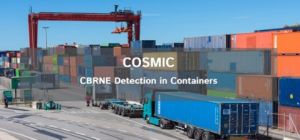The COSMIC three-stage solution includes a primary and secondary inspection stages for the detection of chemical, explosives, biological, radiological and nuclear materials without opening the container and a focused manual inspection opening the container for the detection of bacteria and viruses. The aim of the primary inspection is a fast CBRNE screening of the containers using the first layer of COSMIC sensors in combination with X-ray. If a container is suspected for CBRNE materials, it will pass to a secondary inspection stage, where a second layer of COSMIC sensors with higher precision and reliability are applied. Finally, if the container is suspected, it will pass to the manual inspection stage. The three inspection stages are interconnected by the data fusion engine developed by ATOS. The COSMIC three-stage solution has been optimized to facilitate fast and reliable detection of CBRNE threats in shipping containers. For this three-stage solution, COSMIC has developed innovative sensors, which include:
- A Muon-Sensor developed by Lingacom for the identification of Nuclear and Radiological threats in both primary and secondary stages. It is based on the detection of muons cosmic rays that interact with the container contents.
- A highly sensitive Vapour Analyser developed by SEADM/Lingacom for the detection of chemicals, explosives and bacteria in both primary and secondary stages, which is based on a DMA-MS detector.
- A NA-NOSE sensor developed by Technion for the detection of chemicals and bacteria in both primary and secondary stages. It is Based on nanogold chips able to detect change in resistance to electric current.
- A Biological Detector developed by Ben-Gurion University for bacteria detection in the manual inspection stage, which is based on Polydiacetylene polymers.
- A Virus Sensor developed by SEADM/Lingacom in collaboration with CNB-CSIC and Yale University for virus detection in the manual inspection stage, which is based on a DMA-CPC detector.
Sensors developed in COSMIC project have been validated either in the lab (Virus Sensor, NA-NOSE, Biological Detector) or in real-life environment (Muon-Sensor and Vapour Analyser) with excellent results. All of them have shown a high detection capacity and a very low false alarm, highlighting their potential use at border control and other security applications.
For additional information about COSMIC, visit https://www.cosmic-cbrne.eu/
Project reference: 786945 (october 2018-september 2021)






